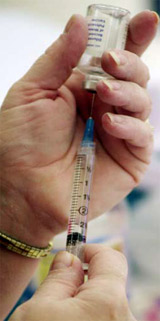Health Topics
-
Healthy Living
-
|
| |
| FAQs on Vaccines for Your Child |
| Dr Anupam Sibal and Dr Shravan Mehra |
| |
 |
Immunization helps protect your child against serious disease. Once children have received a vaccine, their bodies can fight those diseases and the immunity may last for a life. Immunization programs are essential for public health, world over. |
|
In this article we will discuss some common questions which parents have asked us regarding immunization, and list the necessary vaccines which a child must receive, so that parents can then become better informed and effective partners with their doctor in safeguarding their child’s health.
Q. What is a vaccine?
Vaccines are whole or parts of microorganisms given to prevent an infectious disease. Vaccines can consist of whole inactivated microorganisms, parts of the organism like polysaccharide capsules, live attenuated microorganisms and toxoids. A toxoid is a modified bacterial toxin that is made nontoxic but is still able to induce an active immune response against the toxin.
Q What trials are all vaccines subjected to before being licensed?
All vaccines are subjected to 3 phases of clinical trials. Phase I involves generally less than 100 participants mainly to gauge safety and dosing. Phase II involves several hundred or more participants to refine safety and dosing; and finally Phase III that involves thousands of participants. Phase III trials are the major basis for licensure.
Q How do vaccines provide protection?
Vaccines can induce immunity through stimulation of antibody formation or stimulation of cellular immunity, or both.
Q Why are combinations vaccines used?
A combination vaccination is one which has multiple vaccines in a single injection. Currently, various combination vaccines are available. They help in reducing overall number of injections and visits to a pediatrician. This leads to better compliance as parents accept them well and they also reduce the chance of missed vaccination.
Q What vaccines are recommended in special circumstances?
Influenza vaccine is recommended in children with chronic pulmonary disease, hemodynamically significant heart disease, immune compromised state, sickle cell disease, and other hemoglobinopathies, chronic renal dysfunction, chronic metabolic disease, including diabetes mellitus. Pneumococcal vaccine, in addition to the conditions listed above for influenza, is recommended in children with cerebrospinal fluid leaks, compromised functioning of the spleen and cochlear implants. Meningococcal vaccination is recommended in children with immune deficiencies, and as part of outbreak control programs.
Q What vaccines are needed before foreign travel?
Vaccines for travelers include Japanese encephalitis and yellow fever, depending on the location and circumstances of travel.
Q Does the immunization schedule vary if a child has deficient immunity?
Vaccine recommendations for children who are immune compromised or immuno suppressed (transplant patients) vary according to the underlying condition, the degree of immune deficit and the risk for exposure to disease.
Q What happens if a child misses a vaccine by a few days?
The immunization schedule allows for this. Missing a vaccine by a few days is not a cause for concern.
Q What precautions need to be exercised before vaccination?
It is important to observe valid precautions and contraindications to ensure that vaccines are used in the safest manner possible and to obtain optimal response. A standard contraindication for all vaccines is severe allergic reactions like anaphylaxis to a prior dose. Anaphylactic hypersensitivity to vaccine constituents is also a contraindication.
Vaccines usually should be deferred in children with moderate to severe or acute illness, regardless of the presence of fever, until the child recovers. However, children with mild illness may be vaccinated.
Q Does every child need all the newer vaccines that become available? Every child does not need every new vaccine. The decision to administer the vaccine is made by the pediatrician after taking into account the national guidelines and the individual needs of the child.
|
| Vaccines usually should be deferred in children with moderate to severe or acute illness, regardless of the presence of fever, until the child recovers. However, children with mild illness may be vaccinated. |
|
| |
Dr Anupam Sibal is Group Medical Director and Senior Pediatrician, Apollo Hospitals Group & Dr Shravan Mehra is Junior Consultant, Apollo Centre for Advanced Pediatrics, Apollo Indraprastha Hospitals, New Delhi.
|
|